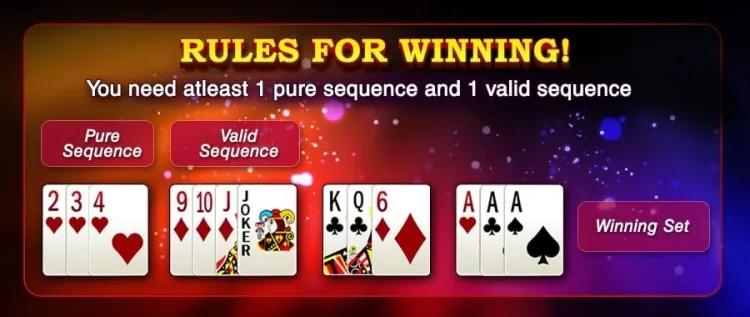Playing Rummy: Rules and Types...!!!
Rummy is a diverse card game with various engaging versions to explore. Whether you're a novice or an experienced player, understanding the basic rules and different Rummy types can enhance your gameplay and enjoyment. Each variant offers unique challenges and strategies, making Rummy a timeless and captivating game for all.

How to Play Rummy
Rummy is a card game family where the goal is to form sets or runs of cards. The primary objective in any Rummy game is to create melds, which are sets (three or four cards of the same rank) or runs (three or more consecutive cards of the same suit).
Basic Rules
-
Number of Players: Rummy is playable by 2 to 6 players.
-
Deck of Cards: A standard Rummy game uses one or two decks of 52 cards each, often with jokers as wild cards.
-
Dealing Cards: Each player receives a certain number of cards from the deck. In a typical 2-player game, each player gets 10 cards. The leftover cards become the stockpile, and one card is placed face-up to start the discard pile.
-
Drawing and Discarding: Players take turns drawing a card from either the stockpile or the discard pile, then discarding one card.
-
Forming Melds: The goal is to create valid sets or runs. Players place their melds on the table.
-
Winning the Game: The game concludes when a player forms all their cards into melds and discards the final card. A player can also win by going out with only one card left after forming melds.

Types of Rummy Games
-
Straight Rummy: The simplest form of Rummy. Players aim to form valid sets or runs, with the first to do so winning. The rules are straightforward, with no variations.
-
Gin Rummy: In this popular variant, players aim to form sets and runs and reduce their deadwood (unmatched cards) to 10 points or less. Players can "knock" to end the game and reveal their cards. The score is based on the difference in deadwood between the knocker and the opponent.
-
Indian Rummy: Also known as 13-card Rummy, this variant is popular in India. Each player receives 13 cards, aiming to form sets and sequences. Players must create at least two sequences, including one pure sequence (without jokers), to win.
-
Kalooki Rummy: Players strive to form sets and runs and achieve the lowest score. Each player's unmelded cards count against them, and the game continues for multiple rounds until a player reaches a predetermined score limit.
-
Oklahoma Rummy: Similar to Gin Rummy, but players draw two cards at the start of each turn, and jokers are wild cards. The game is more dynamic due to the increased number of wild cards.
-
500 Rummy: Players score points by forming sets and runs. The first player to reach 500 points wins. The game spans multiple rounds, with players accumulating points based on the value of their melds.
-
Dummy Rummy: Players aim to complete a series of hands, each with specific requirements (like forming certain sets or runs). The game progresses through predefined stages, with the first player to complete all stages winning.
-
Contract Rummy: Players must complete specific contracts in each round, such as forming certain sets or runs. The contracts become progressively challenging as the game advances, adding strategic depth.
-
Shanghai Rummy: This variant involves multiple rounds, each with specific winning requirements. Players strive to complete the requirements of each round and accrue the fewest penalty points.
Strategy and Tips
-
Observation: Monitor the cards your opponents pick and discard. This helps gauge their strategies and prevent discarding cards they might need.
-
Flexibility: Adapt your strategy based on the cards you draw. Prioritize forming a pure sequence in games like Indian Rummy.
-
Joker Usage: Use jokers strategically to complete higher-value sets or runs. Avoid using them in pure sequences where they aren't allowed.
-
Discarding: Discard high-value cards early if they don't fit into your current melds. This minimizes your penalty points if the game ends unexpectedly.
Rummy is a diverse card game with various engaging versions to explore. Whether you're a novice or an experienced player, understanding the basic rules and different Rummy types can enhance your gameplay and enjoyment. Each variant offers unique challenges and strategies, making Rummy a timeless and captivating game for all.
What's Your Reaction?

















